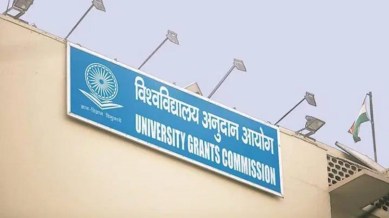Stay updated with the latest - Click here to follow us on Instagram
In UGC draft to curb campus bias: Equity panel for quick action, squads to keep vigil
The draft comes weeks after the Supreme Court, hearing a plea by the mothers of Rohith Vemula and Payal Tadvi, who died by suicide over alleged caste-based discrimination in 2016, told the UGC to submit the new regulations the higher education regulator said it had prepared.

‘Equity committees’ to look into complaints of discrimination; ‘equity squads’ to maintain “vigil” and prevent such incidents; and an ‘equity helpline’ for reporting cases — these are among the provisions in the University Grants Commission’s draft regulations on promoting equity in higher education institutions, which were released for feedback Thursday.
The draft comes weeks after the Supreme Court, hearing a plea by the mothers of Rohith Vemula and Payal Tadvi, who died by suicide over alleged caste-based discrimination in 2016, told the UGC to submit the new regulations the higher education regulator said it had prepared.
The 2025 draft regulations have retained the provision of equal opportunity centres, though this time its functioning and composition has been spelled out. An equal opportunity centre will have an ‘equity committee’, which will manage its functioning as well as enquire into complaints of discrimination.
The equity committees are to be constituted by the head of the institution, who will be the ex-officio chairperson, and will comprise professors, civil society members and student representatives. At least one member has to be a woman, and one each from the SC and ST categories.
A person may report an incident of discrimination via an online portal or the equity helpline. The equity committee is to meet within 24 hours to take action and submit its report to the head of the institution within 15 working days. The head of the institution is to take further action and may inform the police if a case is made out. If the complaint is against the head of the institution, the coordinator of the equal opportunity centre will chair the meeting of the equity committee.
The 2012 regulations had asked institutions to prescribe the procedure to deal with complaints and decide on them within a maximum period of 60 days.
Additionally, under the new draft, institutions will also have mobile ‘equity squads’ to maintain “vigil” and “prevent any kind of discrimination on campus”. The new regulations also call for institutions to designate a stakeholder in each department/ faculty/ school/ hostel/ library as an ‘equity ambassador’.
There’s a separate section on ‘false complaints’ — anyone who makes a “false complaint of discrimination shall be liable to a fine” as determined by the equity committee, or “disciplinary proceedings” in case of “false complaints of a serious nature” or “subsequent false complaints.”
The institutions that do not comply with the regulations will face action.
Under the draft, the UGC will constitute an enquiry committee to look into cases of “non-compliance” and can take steps .
The UGC will accept feedback on the draft until March 28.
Meanwhile, in an affidavit filed in the top court on Thursday, the UGC said 3,067 equal opportunity cells have been set up across the 3,522 higher education institutions that responded to its call for data.
A total of 1,503 caste-based discrimination complaints were received by the cells, and 1,426 were “resolved”.